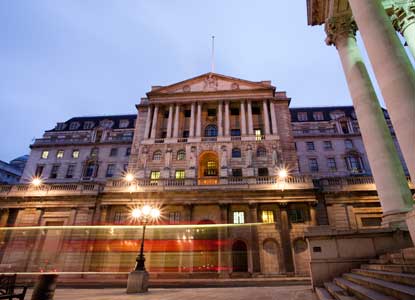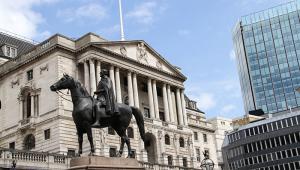The Bank of England has downgraded its forecast for economic growth in the UK this year to zero, and warned that the economy is unlikely to be recover before 2014.
 Bank of England governor Sir Mervyn King said the economy was ‘slowly healing’, with many of the elements for a recovery in place, but it would be a ‘long slow process’.
Bank of England governor Sir Mervyn King said the economy was ‘slowly healing’, with many of the elements for a recovery in place, but it would be a ‘long slow process’.The Bank’s August Inflation report concluded that the decline in economic output in the first two quarters of this year was due to ‘a number of erratic factors’ that were likely to continue throughout 2012
As a result, underlying growth would probably remain ‘soft’ in the short term, the Bank concluded, and would be near zero this year. This is down from the prediction of around 0.8% in May and 2% a year ago.
The ongoing euro crisis, combined with the government’s spending cuts and tight credit conditions, were likely to ‘weigh on demand’, the report concluded.
It added that the ‘unexpected weakness’ in gross domestic product growth was expected to feed through into lower inflation. The Consumer Prices Index measure of inflation will decrease to hit the Bank’s Monetary Policy Committee’s 2% target later this year, before falling below in 2013. It has already reduced from 3.5% in March 2.4% in June.
Colin Edwards, an economist at the Centre for Economics and Business Research, said the downgrade in the growth figures would come ‘as no surprise to many’.
He added: ‘The latest UK forecasts are more in line with our own forecasts for a 0.2% contraction in output for 2012. The announcement of a further £50bn expansion in the asset purchasing programme, otherwise known as quantitative easing, back in July was a clear indication that the Bank viewed the UK’s growth prospects as weak at best.
‘Provisional GDP growth figures released by the Office for National Statistics for 2012 Q2, which showed the UK economy contracted by a much greater than expected 0.7% quarter on quarter, would seem to support this view.’
He added that the expectation that inflation would fall below target in 2013 might ‘give the Bank some room for manoeuvre in further loosening monetary policy to provide a boost to the UK economy’. The CEBR expects a further £50bn of quantitative easing before the end of 2012. This would take the asset purchases to £425bn but ‘whether this would be enough to put the UK back on the path to recovery remains to be seen’, Edwards added.
Nida Ali, an economic adviser to the Ernst & Young Item Club, added that the report showed the MPC was now waiting to see how recent changes affected the economy.
‘Over the past couple of months, the Bank has taken a number of initiatives to loosen monetary policy, such as raising the level of asset purchases, introducing the Funding for Lending Scheme and activating the Extended Term Repo Facility,’ Ali said. ‘MPC members are now in “wait-and-see mode” to judge how they feed into economy, and there was no indication of any further monetary stimulus in the near future. Assuming that the governor’s comments were representative of the majority on the committee, they also appeared to head off any chance of a [interest] rate cut.’
The report follows yesterday’s publication of the National Institute of Economic and Social Research’s monthly estimates of GDP. This found that output declined by 0.2% in the three months ending in July, a smaller fall than the 0.7% estimated in the quarter to the end of June.





















